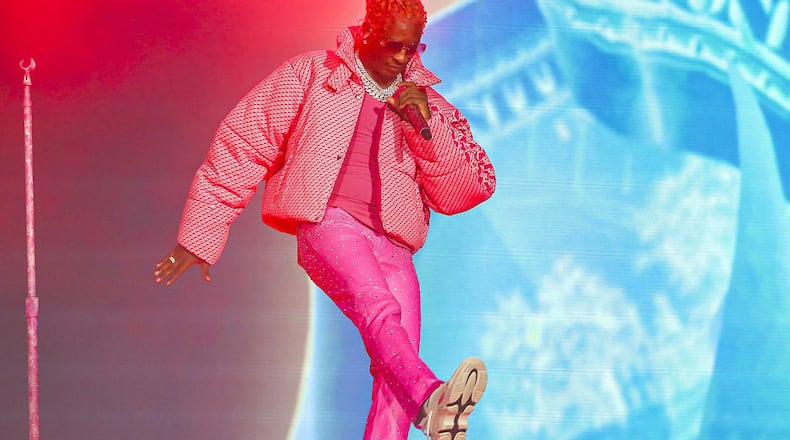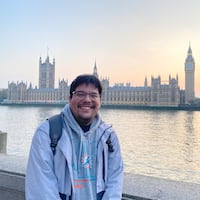A motion filed Tuesday by rapper Young Thug’s legal team aims to remove his lyrics, music videos and social media posts from being used as evidence in his upcoming RICO trial.
According to the motion, using Young Thug’s lyrics, poetry, words, speech or artistry as evidence can be considered as “a Constitutional violation” and “an abuse of discretion.” His legal team argues that Young Thug’s lyrics are protected under the First and Fourteenth Amendments and using them against him is “racist and discriminatory.”
The RICO indictment naming Young Thug, whose real name is Jeffery Williams, and 27 other defendants, cites lyrics including, “I never killed anybody, but I got something to do with that body,” from Young Thug’s 2018 song “Anybody” featuring Nicki Minaj and “I shot at his mommy, now he no longer mention me,” from rapper Juice WRLD’s 2021 song “Bad Boy” featuring Young Thug.
Fulton County District Attorney Fani Willis has defended using lyrics as evidence against Williams and other rappers in the past. Since taking office, Willis and her office have used lyrics as evidence in at least three RICO indictments against alleged gang members.
“I think if you decide to admit your crimes over a beat, I’m going to use it,” Willis said during an August press conference in which she announced the RICO indictment of a gang that was allegedly breaking into celebrity homes in Fulton County. “People can continue to be angry about it. I have some legal advice: don’t confess to crimes on rap lyrics if you do not want them used.”
When announcing the YSL indictment in May, Willis said the First Amendment was “one of our most precious rights” but it didn’t protect someone from having their own words use against them in a criminal proceeding.
The motion comes as music industry groups and members of U.S. Congress are hoping to prohibit the use of lyrics in federal courtrooms. U.S. Rep Hank Johnson and U.S. Rep. Jamaal Bowman, a fellow Democrat, have introduced the Restoring Artistic Protection Act (RAP Act) to limit the admissibility of artists’ lyrics or expressions as evidence in federal court cases.
“To use rap lyrics without proper context in prosecutions, it’s highly prejudicial and deprives the accused of a fair trial,” Johnson told The Atlanta Journal Constitution after he introduced the legislation in July. “I was a criminal defense lawyer for 27 years before I went to Congress so I understand how the deck is stacked against the accused in criminal cases.”
The bill remains in committee. Similar bills have already been passed in some states, including New York and California, where Gov. Gavin Newsom in September signed the Decriminalizing Artistic Expression Act, limiting the use of lyrics as evidence in criminal proceedings.
On Nov. 1, a paid advertisement signed by music groups, record labels and artists ran in the AJC and The New York Times asking prosecutors to stop using lyrics as evidence in criminal trials and urging passage of the RAP Act.
Prosecutors filed a motion Wednesday asking the court to prohibit video recording of court proceedings during pre-trial hearings and during the trial. According to the motion, the state made the request to “protect the integrity of the trial process, the safety and security of witnesses and victims in the case” and in response to witnesses concerns.
To use recording devices, including cameras or audio recorders, a Rule 22 must be file at least 24 business hours prior to the proceeding for which it is requested. Once filed, the judge presiding over the case will decided whether or not to approve the Rule 22.
The motion, along with multiple others, are expected to be heard during hearings scheduled for Dec. 15 and Dec. 19 in Fulton County. The trial is scheduled to start in January, after Judge Ural Glanville denied a state’s motion to delay the trial until March, and could last up to nine months.
Glanville ordered the jury clerk to send out enough subpoenas to net 600 prospective jurors. They will be divided into three groups of 200, with each group completing, under oath, questionnaires to be prepared by the court from Jan. 4-6. Preliminary examinations will begin Jan. 9, with prospective jurors returning daily in panels of 24.
Williams, along with rapper Gunna, whose real name is Sergio Kitchens, and other defendants remain in jail. Bond has been denied multiple times since they were indicted.
About the Author
The Latest
Featured



